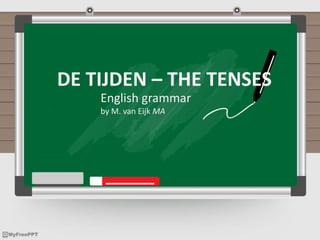
Verb tenses - tijden M. van Eijk MA
- 1. DE TIJDEN – THE TENSES English grammar by M. van Eijk MA
- 4. Past Simple > gebruik • De Past Simple gebruik je om aan te geven dat iets in het verleden is gebeurd. Vaak wordt het tijdstip genoemd, bijvoorbeeld: yesterday, last year, when I was younger. • Je gebruikt de Past Simple ook wanneer je vraagt naar wanneer iets gebeurde (zin met WHEN).
- 5. Past Simple > tijdbalk • Wanneer je de Past Simple in een tijdbalk weergeeft, ziet het er als volgt uit: •
- 6. Past Simple > vorm • Bevestigende zinnen • Vragende zinnen • Ontkennende zinnen
- 7. Past simple > vormen Bevestigende zinnen Vragende zinnen Ontkennende zinnen Regelmatige ww: ww + (e)d Onregelmatige ww: 2e rijtje Did ...... + hele ww didn't + hele ww I worked You worked He/she/it worked We worked You worked They worked Did I work? Did you work? Did he/she/it work? Did we work? Did you work? Did they work? I didn't work You didn't work He/she/it didn't work We didn't work You didn't work They didn't work
- 8. Past Continuous > gebruik • De Past Continuous gebruik je om aan te geven dat iets in het verleden een tijd duurde of dat er iets op een bepaald moment in het verleden aan de gang was.
- 9. Past Continuous > in tijdbalk
- 10. Past continuous > vormen Bevestigende zinnen Vragende zinnen Ontkennende zinnen I was working You were working He/she/it was working We were working You were working They were working Was I working? Were you working? Was he/she/it working? Were we working? Were you working? Were they working? I wasn't working You weren't working He/she/it wasn't working We weren't working You weren't working They weren't working
- 11. Present Simple > gebruik • De Present Simple gebruik je voor feiten en gewoontes, voor zaken die altijd, nooit of regelmatig gebeuren. • Vaak staat er wel een woord in de zin zoals: always, never, ever, usually, sometimes, every day.
- 12. Present Simple > vorm • Bevestigende zinnen • Vragende zinnen • Ontkennende zinnen
- 13. Present Simple > vorm(en) Bevestigende zinnen Vragende zinnen Ontkennende zinnen I/we/you/they: hele ww he/she/it: hele ww + (e)s I/you/we/they: do + hele ww He/she/it: does + hele ww I/you/we/they: don't + hele ww he/she/it: doesn't + hele ww I work You work He/she/it works We work You work They work Do I work? Do you work? Does he/she/it work? Do we work? Do you work? Do they work? I don't work You don't work He/she/it doesn't work We don't work You don't work They don't work
- 14. Present Continuous > gebruik • Wanneer iets NU aan de gang is Vb: I am playing at the moment. • Je ergeren aan iets dat vaker gebeurt. Vb: He's always smoking. • Afspraak in de nabije toekomst. Vb: Tonight I'm meeting Jane.
- 15. Add Your Title
- 16. Present Continuous > tijdbalk • Wanneer je de Present Continuous in een tijdbalk weergeeft, ziet het er als volgt uit:
- 17. Present Continuous > vorm(en) Bevestigende zinnen Vragende zinnen Ontkennende zinnen I am working You are working He/she/it is working We are working You are working They are working Am I working? Are you working? Is he/she/it working? Are we working? Are you working? Are they working? I am not working You aren't working He/she/it isn't working We aren't working You aren't working They aren't working
- 19. FUTURE > gebruik • De FUTURE gebruik je om aan te geven dat iets nog gaat gebeuren.
- 20. FUTURE > gebruik WILL + werkwoord In de eerste persoon enkelvoud (I) en meervoud (WE) is ook SHALL mogelijk in plaats van WILL. Shall wordt echter voornamelijk gebruikt om een voorstel te doen: Vb: Shall I carry these suitcases for you?
- 21. FUTURE > WILL + werkwoord Vb: I will go to England someday. Vb: You will never walk alone. Shall kan dus alléén bij I en WE i.p.v. WILL. Vb: Shall I carry these suitcases for you?
- 22. BE GOING TO • BE GOING TO gebruik je om aan te geven wat je van plan bent, of wat vast wel zal gebeuren. • Een vorm van het werkwoord BE (= am / are / is) + GOING TO + werkwoord • Vb: I’m going to see Joan tonight.
- 24. The End!
